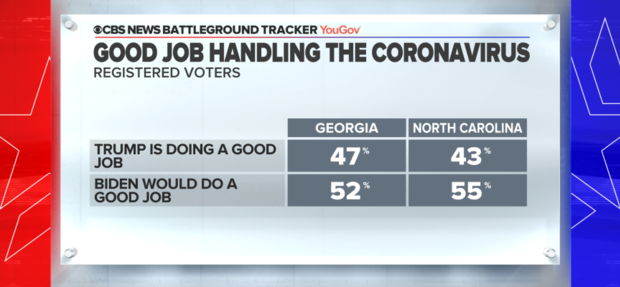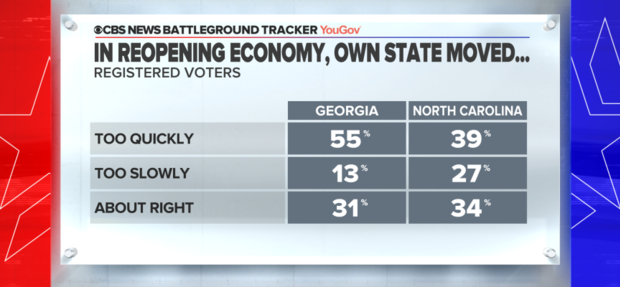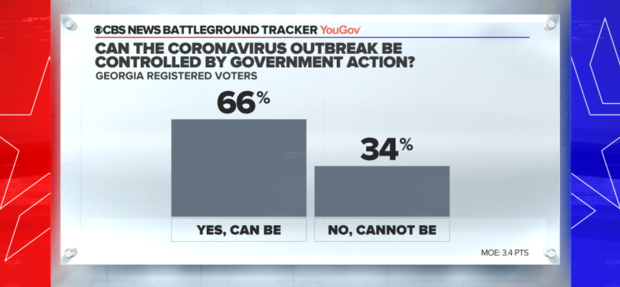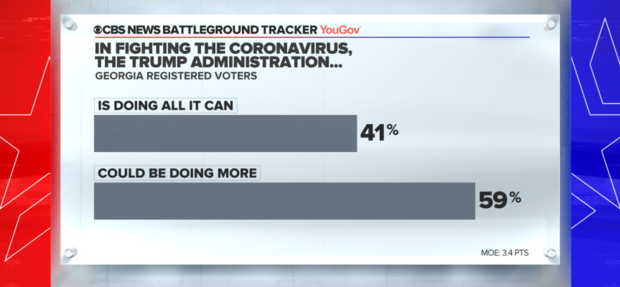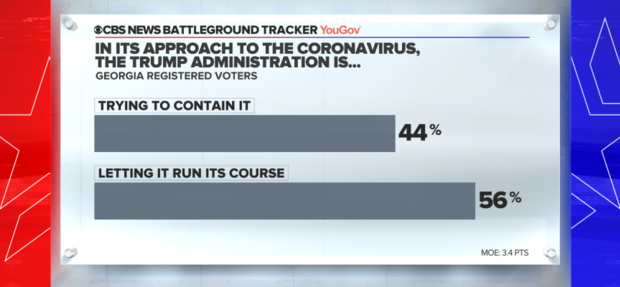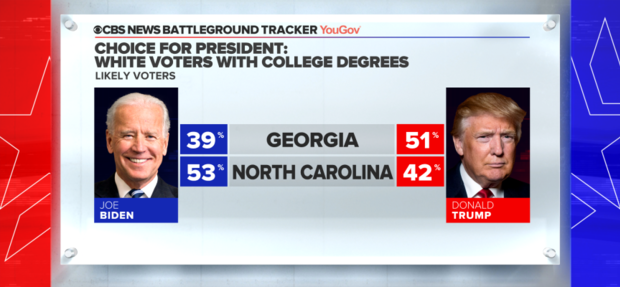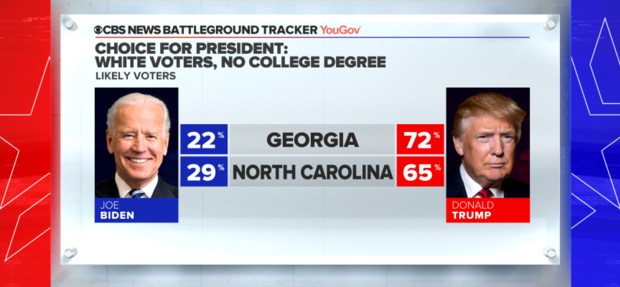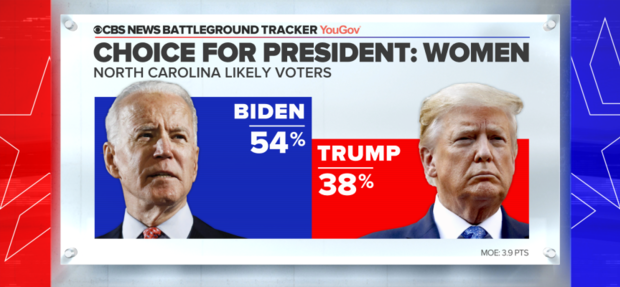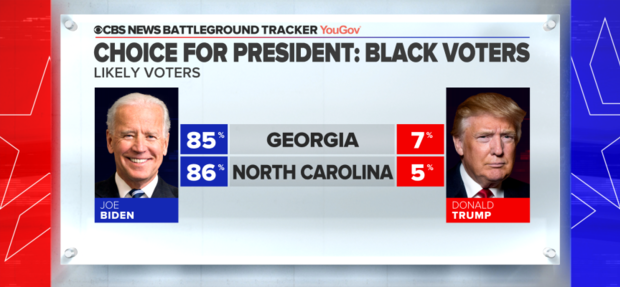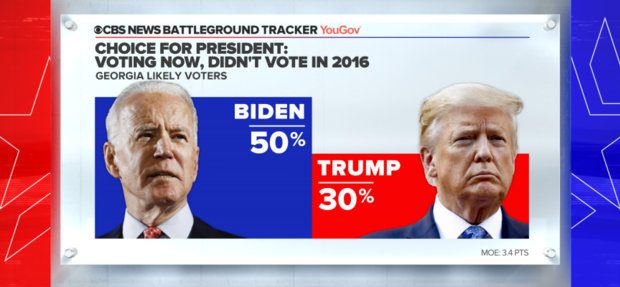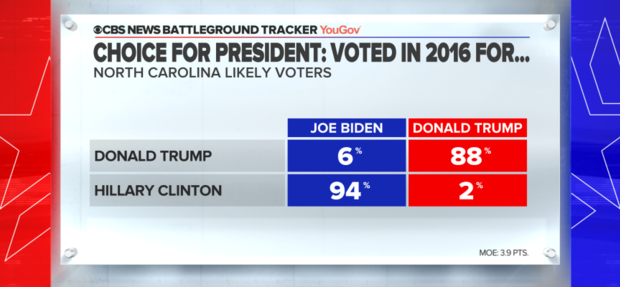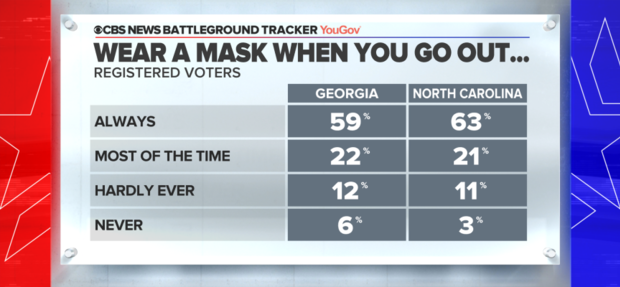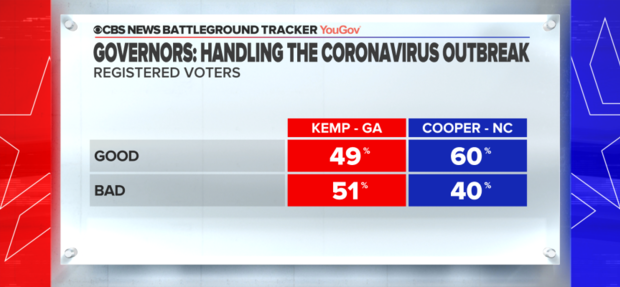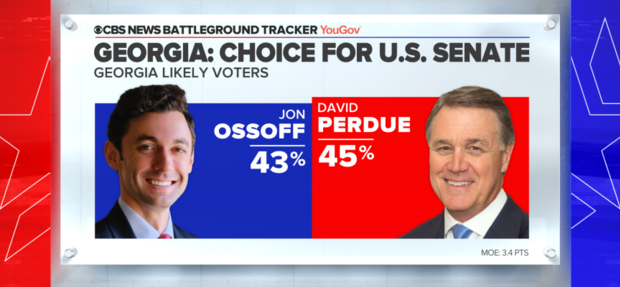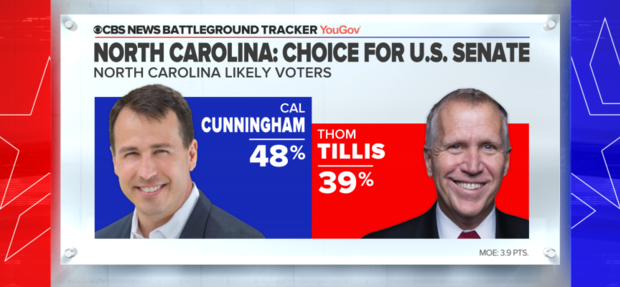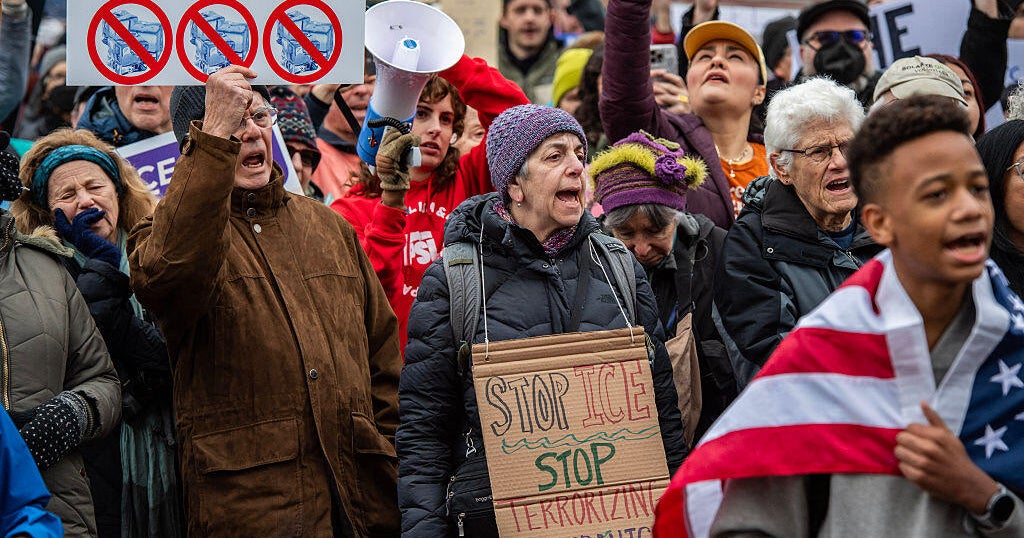Biden has edge in North Carolina and race is tight in Georgia — CBS News Battleground Tracker poll
It's another two states and another two competitive contests, as concern about President Trump's handling of coronavirus continues to take a political toll on him.
Together, North Carolina and Georgia add to our picture of an expanded electoral map. Biden is up four points in North Carolina, where Democrats haven't won a presidential race since 2008. Biden is up one in Georgia, and the last time a Democrat won there, Athens' hometown band R.E.M. had just released its 1992 classic "Automatic for the People." The race today is so close, winning will be anything but automatic — for either side.
Coronavirus impact
Views of the president's handling of the outbreak are underwater in Georgia and North Carolina, as they are in the country as a whole — but nonetheless bolstered by Republicans who say he is doing a good job, even if many of them aren't saying he's doing a very good job. And a larger number of voters think Biden would do a good job handling the outbreak than think Mr. Trump is now.
But here, as around the country, we find differences on the perceived extent of the problem. Democrats are four times more likely to say Georgia's outbreak is a "crisis." Republicans tend to call it a "very serious problem, but not a crisis." The more seriously voters view the outbreak, the more likely they are to back Biden; the less seriously they view it, the more likely they are to back the president.
In Georgia, a 55% majority says the state reopened too quickly, with fewer (31%) saying it moved at the right speed. In North Carolina, where coronavirus cases and deaths have been lower, voters are more evenly split between "too quickly" (39%) and "about right" (34%) on the pace of their state reopening.
As in other states, those feeling it moved too fast say their state did so under pressure from the Trump administration.
As we've consistently seen in our polling, more Mr. Trump voters cite the economy as a major factor in their vote than cite coronavirus. The President is seen as better than Biden on the economy in Georgia, but only marginally better in North Carolina. In the case of the latter, that still isn't enough to give him a lead.
Coronavirus: Is the Trump administration doing all it can?
We asked voters if the coronavirus is something the government could do anything about, in principle, and then we asked if the Trump administration is doing all it can?
Most do see a role for government here: two-thirds of Georgia voters say the U.S. outbreak can be controlled with "effective policy and government action." It's largely driven by Democrats — nearly 9 in 10 say so — but so do a narrow majority of independents and half of Republicans.
There are larger divides on whether the Trump administration is in fact doing all it can. Here, only 4 in 10 say so, driven mostly by Republicans, among whom 8 in 10 say so. Six in 10 independents say the administration could be doing more, along with nearly all Democrats.
In both states, about half of voters say both that the outbreak can be controlled by effective policy and that the administration is not doing enough. Independents in this group are currently going for Biden over Mr. Trump in terms of vote choice by more than eight to one.
And asked what they think the administration's approach is, in Georgia, a 56% majority say the administration is "letting the virus run its course," while 44% say it's trying to contain the spread. These views are closely tied to perceptions of how well Mr. Trump is handling the issue. Almost no one who thinks the administration is letting the virus run its course thinks the president is doing a good job.
What's behind the horse race?
Biden has made inroads with White voters in both these states, contributing to their competitiveness. Compared to 2016, Mr. Trump's current share of the White vote is down 12 points in Georgia and 7 points in North Carolina. Coupled with Biden's overwhelming support among Black voters, both races look like toss-ups at the moment.
Among White voters, we see a dramatic split here between voters with and without college degrees, even more so than we saw in the Upper Midwest.
Among college-educated whites, fast becoming a key part of Democratic hopes everywhere, Biden has improved on Hillary Clinton's 2016 figures by double digits in each state. In Georgia, where Mr. Trump still maintains a lead among them, the race partially hinges on whether this group continues to shift toward Democrats, further cutting into Mr. Trump's margins.
Biden has not made as large gains among White voters without college degrees in these southern states as he has in Michigan and Ohio. At 22% support, he's doing slightly better than Clinton did with this group in Georgia (not a high bar). At 29% in North Carolina, Biden is attracting about the same support as Clinton.
Non-college-educated Whites say having Mr. Trump as president makes them feel confident and proud, and most would not feel that way if Biden wins. They also tend to rate the president as better than Biden on a variety of qualities, including authentic, hard-working, strong, and smart.
The pattern shifts a lot among college-degree-holding White voters in North Carolina, where Biden leads among them currently. They give Biden higher marks on being smart, compassionate, authentic, and honest, by wide margins. This view is even more dramatic among college-educated women there — a core part of the voting bloc that led to Democratic House gains in 2018 — and continues here. Georgia's White college voters are more mixed.
(In each of these cases, of course, it's less clear which causes which; it's certainly plausible that people bring positive descriptions into line with a preexisting partisan vote choice. Either way, there are not many people voting for either candidate in spite of any perceived shortcomings.)
In North Carolina, Biden has improved upon Clinton's margin with women. He currently leads Mr. Trump by 16 points among them, more than double Clinton's margin in 2016. Among White women with college degrees, Biden's lead grows to more than 20 points.
In both states, Biden gets strong support from Black voters, particularly Black women. And Black voters supporting Biden are twice as likely as White supporters to say they are backing him because they like him. Most White Biden voters say the main reason they are backing Biden is to oppose President Trump.
Candidate qualities and characteristics
Very few of each candidates' voters would even consider voting for their opponent. But more than that, the other side makes them nervous — perhaps yet another sign of polarization here. Nearly nine in 10 Biden voters in both states say they feel nervous with Donald Trump as president, about the same proportion of Mr. Trump voters who say they would feel nervous if Biden were to win in November.
One thing that does transcend party — big majorities say they do not feel "bored" with Mr. Trump as president.
But there is somewhat of an empathy gap in these states: Biden leads Mr. Trump on being seen as "compassionate" (by 15 points in Georgia and 19 points in North Carolina).
And Mr. Trump leads Biden on being seen as "strong" in Georgia, with a narrow edge in North Carolina. In addition to Republicans, more independents see Mr. Trump as "strong" than see Biden that way, and those who do are backing the president.
Many more voters in both states see Biden as a liberal than a moderate; many more see Mr. Trump as a conservative than a moderate. In campaigns, each side often tries to paint the other as out of the mainstream. Here, voters already have views of both candidates as more ideological.
Biden is winning '16 non-voters in Georgia by 20 points — another data point that emphasizes how important turnout is to his prospects, including bringing new voters into the mix.
The vote in Georgia is even more partisan than the very partisan patterns we've seen elsewhere: a scant 3% of Republicans are for Biden, lower than the 8% nationwide. Just 1% of Democrats are for Mr. Trump.
We see more erosion of Mr. Trump's base in North Carolina than in Georgia. In the Tar Heel State, 88% of former Mr. Trump voters are backing him again this year, while 6% say they now support Biden. While this may seem like a small number, it is notably higher than the 2% of Clinton '16 voters who now say they are switching to Mr. Trump, reinforcing a pattern we've been observing across states from the Rust Belt to the Sun Belt.
Wearing masks
Most Democrats and independents see the decision to wear a mask as a public health responsibility, while Republicans are divided, with half agreeing and half feeling it's a personal health choice.
But talk of widespread anti-mask sentiment may be overblown, at least in these states. Most voters in Georgia and North Carolina say they are wearing masks most of the time, including six in 10 who are wearing them all the time. There are differences in degree — most Democrats report wearing a mask all the time when they go out, as do most independents in North Carolina (and half in Georgia). About half of Republicans say they wear masks all the time when they go out in each state.
It has a lot to do with concern, and experience. The more concerned someone is about getting the virus, the more likely they are to report wearing a mask. Those who do not wear one tend to live in towns and rural areas and, like voters overall, think the cities get a lot of the impact.
Georgia voters largely feel that cities and towns should be able to set their own rules for restrictions rather than follow only rules set by the governor – a view that extends across majorities of all partisan groups. Ratings of Governor Brian Kemp's handling of coronavirus are perfectly split and largely partisan. In North Carolina, Governor Roy Cooper gets largely positive ratings, and in our latest Michigan polling, Governor Gretchen Whitmer also received mostly positive ratings on her handling of the outbreak there.
The protests
In both states, more than half of voters agree with the ideas expressed by the Black Lives Matter movement, driven largely by Democrats and Black voters. Republicans disagree with the movement in large numbers.
Republicans give the president high marks on this handling of protests about the treatment of African-Americans by police, including more than half who strongly approve.
Voting by mail
As we've seen in other states, more Democrats than Republicans in Georgia and North Carolina would like to see voting by mail made easier in their state and are more inclined to want to vote that way this election.
Overall, in these states, Black voters are somewhat more likely than White voters to say they would prefer to vote, but preferences are mostly related to partisanship.
Among Democrats in Georgia, more White Democrats (61%) say they prefer to vote by mail than Black Democrats (45%), although it is still the top preferred voting method for Black Democrats.
The more concerned people are about contracting the virus, the more likely they are to want to vote by mail. Democrats overall are more concerned about the virus than Republicans. Note that early voting is quite popular in these states. Georgia, we estimate, typically casts about 60% of its vote early either by mail or in person, and North Carolina has cast two-thirds early in recent years, and those numbers could increase now.
And as we've seen in some of our previous polling, Republicans, Whites and older voters are likely to describe the voting process — that is registering and casting a vote — as "very easy," compared to Democrats, racial minorities and younger voters.
Senate races
Both Georgia and North Carolina have Republican senators running for reelection this year, and neither appears to be safe at the moment. In Georgia, David Perdue leads Democratic challenger Jon Ossoff by 2 points. Perdue is running ahead of Mr. Trump, in part, by pulling in about 5% of Biden supporters. One in 10 voters say they're not sure about their Senate vote yet; they lean Republican in terms of their past vote, but they are also disproportionately non-white.
In North Carolina, Thom Tillis is running behind Mr. Trump, trailing Democratic challenger Cal Cunningham by nine points. Tillis' margin among White voters is just half that of Trump's, and 9% of past Trump voters say they're backing Cunningham for Senate. Here too, unsure voters lean Republican in terms of their presidential vote, indicating that this race could very well tighten.
These surveys were conducted on behalf of CBS News by YouGov between July 28-31, 2020. They are based on representative samples of 1,131 registered voters in Georgia and 1,152 in North Carolina. Margins of error for registered voters are +/- 3.4 points in Georgia and +/- 3.8 points in North Carolina.
Poll toplines:


